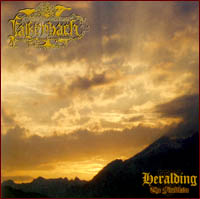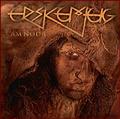FALKENBACH (de) - Heralding - The Fireblade (2005)

Label : Napalm Records / Season Of Mist
Sortie du Scud : 25 novembre 2005
Pays : Allemagne
Genre : Folk Black Metal épique
Type : Album
Playtime : 8 Titres - 42 Mins
C’est en 1989 que FALKENBACH fait son apparition dans le microcosme naissant des groupes de Black Metal épique avec BATHORY en tête.
Alors que les débuts du groupe semblaient influencés par le Black, le second album Magni Blandinn Ok Megintiri se focalise quant à lui plus sur une composition et des arrangements résolument un brin plus Epique. Habitué à réaliser ses albums en autodidacte, Heralding-The Fireblade est le quatrième album studio du groupe, où s’entrechoquent chœurs, voix claires et criardes, guitares acoustiques et guitares saturées, instruments à vent.
On s’aperçoit d’entrée que Vratyas Vakyas a réenregistré « Heathen Foray » qui figurait sur le second album du groupe, donnant une orientation plus rageuse au morceau, même si personnellement la version originale lui est supérieur.
La collaboration avec des musiciens extérieurs au groupe ne doit pas y être étrangère, l’apport de nouveaux musiciens contribuant à apporter du sang neuf aux compositions, l’opus se retrouve ainsi équilibré entre des morceaux purement Black comme l’efficace « Of ForestsUnknown », « Roman Land », la puissante « Laeknishendr » et d’autres plus épiques, tels que les hymnes « Heathen Foray », « Havamal » ou « Skirnir ».
Une fois de plus enregistré au Tidalwave Studio suite à Ok Nefna Tysvar Ty, FALKENBACH nous propose ici son album le plus varié et le plus rageur, eu égard à sa discographie. FALKENBACH ou le dernier défenseur d’une certaine vision du Black épique et folklorique.
Ajouté : Mardi 01 Novembre 2005
Chroniqueur : Loki
Score :    
Lien en relation: Falkenbach Website
Hits: 17045
|














